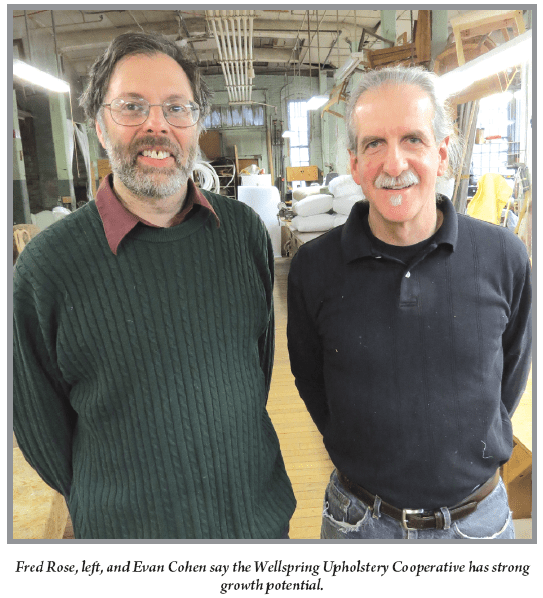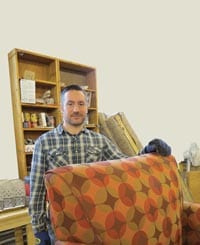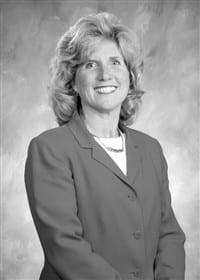A Healthy Path to Job Growth – Medical Systems Add Their Support to Wellspring Initiative
Bob Demerjian says he saw the ad last fall on a state website featuring job postings. It caught his eye for several reasons.
For starters, he had been unemployed for some time, and realistic opportunities to rejoin the workforce had become quite scarce. But there was something else. While waiting for such an opportunity to develop, Demerjian had begun to learn the somewhat obscure trade of upholstery, and had landed a few odd jobs. Escalating this activity into a vocation seemed unlikely, though.
Fast-forward a few months, and Demerjian is stripping the fabric off a chair that until recently occupied the lobby at the campus hotel at UMass Amherst. He is working in the spacious confines of Alliance Upholstery in a century-old building in Springfield’s South End where monkey wrenches were once made, and, decades later, Bottaro-Skolnick Furniture had its showrooms.
He is the first official employee owner of something called the Wellspring Upholstery Cooperative (WUC), and the hope, and expectation, is that there will soon be many more.
Wellspring is the name of a unique collaborative designed to create economic opportunities and revitalize Springfield’s neighborhoods. Launched in 2011 with a grant from the Robert Wood Johnson Foundation, the program intends to use the purchasing power of the region’s largest employers to provide a market for new, worker-owned companies that will create entry-level jobs and ownership opportunities for unemployed and underemployed residents.
These employers, also called ‘anchors,’ include Baystate Health, the Sisters of Providence Health System, Springfield Technical Community College (STCC), UMass Amherst, and Western New England University, and the hope is to add more, said Fred Rose, co-director of the Wellspring Collaborative at the Center for Public Policy and Administration at UMass Amherst.
“It’s estimated that these major institutions purchase more than $1.5 billion worth of goods and services a year, and maybe less than 10{06cf2b9696b159f874511d23dbc893eb1ac83014175ed30550cfff22781411e5} of it comes from the Springfield area,” he noted. “So there’s a big potential market for goods that we could produce locally, and we’ve been meeting with their purchasers and identifying possible opportunities.
“If we could shift just 10{06cf2b9696b159f874511d23dbc893eb1ac83014175ed30550cfff22781411e5} of that $1.5 billion, we could create 2,000 or 3,000 jobs in this city,” he went on. “We want to build a capacity for these institutions to use their purchasing powers to drive some development.”
Rose said Wellspring was inspired by the many examples worldwide of worker-owned businesses successfully serving such anchors. Perhaps the most notable is the program known as the Evergreen Cooperatives in Cleveland. The initiative, which involves Case Western University, the Cleveland Clinic, University Hospitals, and other major employers, has grown to include a laundry, a solar-power operation, and a growers cooperative, said Rose, adding that the program has created hundreds of jobs.
But there are many other examples of how this concept works effectively, said Rose, citing the Mondragon Cooperatives in Spain’s Basque region as another.
In Springfield, the Wellspring initiative has begun with an upholstery shop, said Rose, because there is recognized need for such services, an existing infrastructure in the form of the Alliance Upholstery facilities, and an important partner at the Hampden County Sheriff’s Department, which has operated an upholstery program for years and provides a pool of employee candidates with some initial upholstery training.
But there could be other businesses underway in the near future, including a greenhouse operation that would supply fresh fruits and vegetables to those anchor businesses, as well as a laundry and other ventures.
The Wellspring initiative involves a number of partners in addition to those anchors, including Jobs with Justice, the New North Citizens Council, the Center for Popular Economics, Partners for a Healthier Community, GreenWorks, the Pioneer Valley Project, the Hampden County Regional Employment Board, Springfield Neighborhood Housing Services, MassMutual, and the United Way of Pioneer Valley.
That list reveals that the program is not only about jobs and economic development, said Steve Bradley, vice president of Government and Community Relations and Public Affairs at Baystate Health. It’s also about neighborhoods, and the overall health of the region.
“There’s a very direct correlation between income levels and both an individual’s and family’s health status,” he said when explaining why a health system would become involved in an economic-development endeavor of this nature. “Simply put, the poorer you are, the worse your health is going to be.”
For this issue, HCN goes behind the scenes at the upholstery cooperative for a look at this intriguing operation, and also talks with a number of those involved with Wellspring to gauge its potential as a vehicle for generating economic development — and much-needed jobs — in the city’s poorest neighborhoods.
Seats of Government
Evan Cohen, long-time owner of Alliance Upholstery, a venture that at one time took his name, said his trade is somewhat of a lost art.
Decades ago, he noted, there were a number of upholstery shops in Greater Springfield employing hundreds of highly trained craftspeople. Alliance is one of the few operations left, and it handles everything from new, high-end furniture to old sofas and chairs that need a new look and a new seat. But there is still a good deal of demand for services, as indicated by the number of projects in progress and in waiting on his shop floor.
Scattered among those mostly high-end new pieces and some antiques have been some institutional projects, including 65 booth-like pieces from the Berkshire Dining Commons at UMass Amherst, several chairs from the mayor’s office in Westfield, assorted pieces from the campus hotel at UMass, and others.
These represent what Rose and others describe as the start of what could be a thriving enterprise, and the first of a series of businesses designed to keep a portion of that aforementioned $1.5 billion in the City of Homes.
“Our goal is to create a network of these businesses,” said Rose, adding that the ultimate success of the Wellspring initiative will be determined by how effective its organizers are at identifying need among those anchor institutions and creating efficient, profitable ventures to meet them.
There is certainly ample evidence in both this country and abroad to suggest that worker-owned businesses supplying such anchors is a viable economic-development strategy, he said, adding that the Mondragon Cooperatives in Spain have grown to 110 cooperatives employing more than 80,000 people in 2012. Meanwhile, Cleveland’s Evergreen program has grown to four businesses and has received national attention for its potential to revitalize blighted neighborhoods.
It will take years, if not decades, to approach those levels of success, Rose went on, adding that the long-range business plan is to generate smart, need-driven expansion that will meet Wellspring’s stated goals of creating jobs while also revitalizing neighborhoods.
Getting the WUC off the ground has been roughly a two-year initiative, and a learning experience on a number of levels, said Rose, one that involved everything from identifying partners to securing capital to attracting those first customers. And the operation takes Wellspring from words on an informational brochure to reality, which is an important first step.

“We learned a lot getting this business started,” said Rose. “We had to raise $145,000 in capital, and that was challenging, because not a lot of places want to put money into startup companies.”
Funding was eventually obtained from what Rose called a “socially responsible investor” in Boston, while a line of credit was secured from Freedom Credit Union, and a $15,000 grant was attained from the city’s small-business loan program.
And while funding was being located, organizers were creating partnerships with Alliance Upholstery and the Sheriff’s Department, which has contracts for upholstery work with many of those aforementioned anchors, but has limited capacity, so potential exists for handling overflow. Only a few people currently work at the WUC, said Rose, but the possibility exists to add another six or more before the end of the year.
Couching Their Remarks
Ira Rubenzahl, president of STCC, has been to Cleveland, and he’s toured some of the Evergreen facilities. He came away inspired, believing that Springfield could replicate some of that success.
“Cleveland is very impressive,” he said. “They have major institutions there like the Cleveland Clinic, which is an enormous operation. They’re on a much different scale there, but the concept works, and it’s something we can do here.”
Like others we spoke with, Rubenzahl said the worker-owned-business model has a number of attractive qualities that go beyond simple job creation. Indeed, there is a wealth-creation component to the initiative that could drive home ownership and prompt investments in the neighborhoods where these businesses are located.
“We believe that additional business development is important for the city, especially business development that could employ people of modest skills,” said Rubenzahl. “We have a lot of people in this city without college degrees who need jobs, and this idea of enabling people to pull themselves up by their bootstraps and do it themselves has a certain attraction for us at the college. We think this is an important initiative, and we’re very supportive of it.”
Bradley agreed. He said Baystate became involved in Wellspring as part of its Community Benefits Program, and has been inspired by the program’s goal of stimulating development in areas of the city where there has been little private-sector investment in recent years.
The Baystate system provided the project with some seed money ($50,000) as well as some technical support, most of it from Frank Robinson, president of Partners for a Healthy Community. And the system is committed to helping initiatives like the WUC become reality because of their impact on overall health within a community, especially one like Springfield, which has nearly half its population living at or below the poverty line.
“When you look at the direction in which healthcare is moving, there is a greater focus on education, prevention of disease, and the promotion of wellness,” he explained. “And one of the factors in that equation is economic status; if we can help local people create and grow jobs in their neighborhoods through co-ops, then we can help raise the economic status of those individuals and their families, which will in turn create a much healthier community.
“We like to say healthcare is more than just acute care, and it’s more than just treating people who have serious disease,” he added. “It’s all of that, but it’s also about investing in the health of the community as a whole, and focusing on population health.”
Dan Keenan, vice president of Government Relations for the Sisters of Providence Health System, concurred.
“It’s simple — jobs are a key component to a healthy community,” he said by way of explaining the system’s involvement in Wellspring. “There’s been a lot of studies showing that a key health indicator is employment.”
Sofa, So Good
As he ripped the old fabric off that chair from UMass, Bob Demerjian used simple, direct, upbeat language to talk about Wellspring and the break it has provided for him.
“It’s good — I like the work,” he said. “I’m learning a skill that few people have. It’s an opportunity for me.”
It’s an opportunity for the region as well, to tap into the buying power of those anchors and create businesses that may help change the fortunes of some Springfield neighborhoods.
Demerjian is the first Wellspring employee, and all those involved believe he will be the first of many.




